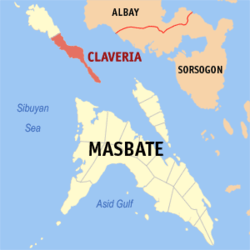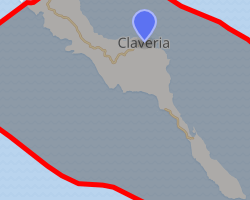Claveria, Masbate
Claveria, officially the Municipality of Claveria, is a 3rd class municipality in the province of Masbate, Philippines. According to the 2015 census, it has a population of 43,693 people.[3]
Claveria | |
|---|---|
| Municipality of Claveria | |
 Map of Masbate with Claveria highlighted | |
OpenStreetMap 
| |
.svg.png) Claveria Location within the Philippines | |
| Coordinates: 12°54′13″N 123°14′45″E | |
| Country | |
| Region | Bicol Region (Region V) |
| Province | Masbate |
| District | 1st district |
| Founded | September 5, 1959 |
| Barangays | 22 (see Barangays) |
| Government | |
| • Type | Sangguniang Bayan |
| • Mayor | Henedina V. Andueza |
| • Electorate | 24,801 voters (2019) |
| Area | |
| • Total | 182.98 km2 (70.65 sq mi) |
| Population (2015 census)[3] | |
| • Total | 43,693 |
| • Density | 240/km2 (620/sq mi) |
| • Households | 9,159 |
| Economy | |
| • Income class | 3rd municipal income class |
| • Poverty incidence | 53.56% (2015)[4] |
| • Revenue (₱) | 113,729,609.90 (2016) |
| Time zone | UTC+8 (PST) |
| ZIP code | 5419 |
| PSGC | |
| IDD : area code | +63 (0)56 |
| Climate type | tropical rainforest climate |
| Native languages | Masbateño language Tagalog |
It is located on the southern portion Burias Island, southeast of the nation's capital of Manila.
Etymology
The municipality was named after the Spanish governor-general Narciso Clavería y Zaldúa, who in 1844 anchored at Punduhan Paloha, the present site of Recodo (Poblacion District II), while in pursuit of Moro pirates, and named the place after himself.
History
Bicolanos from Albay, Sorsogon and nearby provinces and Tagalogs from the Bondoc Peninsula are considered as the first settlers of Burias Island. Their original settlement, called Matandang Nayon ("Old Village"), was founded near the bank of the Siargao River.
In the 19th century, when the Spaniards were fighting the Moros in many parts of Mindanao, Burias Island became a refuge for retreating Moros due to its relatively isolated location and deep safe harbors. After Governor General Claveria's visit, it became the first sitio called “Visita”, a spanished term for visit.
In 1898 during the Philippine Revolution, Barrio Visita became a town and officially adopted the name Claveria, with Arcadio Sabaulan as Presidente Municipal. The first Justice of the Peace was Estanislao Abetria and the first priest was Padre Rebeya.
Three years later, in 1901, a cholera epidemic severely affected the municipality, resulting in a large population decrease. Consequently, the municipality was reverted to a barrio by virtue of a Municipal Council resolution, with Marcelo del Rosario as appointed Cabesa de Barangay.
In the middle of the 20th century, residents of Claveria began the initiative to reestablish Claveria into a municipality, especially spearheaded by Eleuterio C. Ombao, then head teacher of Claveria Elementary School. Despite strong opposition from the Municipality Council of San Pascual, Bill RA 2187 creating Claveria into a municipality was approved in the House of Representatives on May 7, 1959. September 5, 1959, was inauguration day, and Councilor Alfredo Alim was appointed Municipal mayor, also winning this position during the first local election in November of that year.
Barangays
Claveria is politically subdivided into 22 barangays. [2]
- Albasan
- Boca Engaño
- Buyo
- Calpi
- Canomay
- Cawayan
- Poblacion District I (Town Proper)
- Poblacion District II (Town Proper)
- Imelda
- Mababang Baybay
- Mabiton
- Manapao
- Nabasagan
- Nonoc
- Osmeña
- Pasig
- Peñafrancia
- Quezon
- San Isidro
- San Ramon
- San Vicente
- Taguilid
Climate
| Climate data for Claveria, Masbate | |||||||||||||
|---|---|---|---|---|---|---|---|---|---|---|---|---|---|
| Month | Jan | Feb | Mar | Apr | May | Jun | Jul | Aug | Sep | Oct | Nov | Dec | Year |
| Average high °C (°F) | 27 (81) |
28 (82) |
29 (84) |
31 (88) |
31 (88) |
31 (88) |
30 (86) |
29 (84) |
29 (84) |
29 (84) |
29 (84) |
28 (82) |
29 (85) |
| Average low °C (°F) | 22 (72) |
22 (72) |
22 (72) |
24 (75) |
24 (75) |
25 (77) |
25 (77) |
25 (77) |
25 (77) |
24 (75) |
24 (75) |
23 (73) |
24 (75) |
| Average precipitation mm (inches) | 55 (2.2) |
36 (1.4) |
45 (1.8) |
42 (1.7) |
114 (4.5) |
184 (7.2) |
245 (9.6) |
224 (8.8) |
238 (9.4) |
171 (6.7) |
130 (5.1) |
94 (3.7) |
1,578 (62.1) |
| Average rainy days | 13.0 | 9.5 | 11.8 | 12.7 | 21.3 | 25.3 | 28.3 | 26.5 | 26.4 | 24.2 | 19.9 | 16.1 | 235 |
| Source: Meteoblue [5] | |||||||||||||
Demographics
|
| |||||||||||||||||||||||||||||||||||||||
| Source: Philippine Statistics Authority[3][6][7][8] | ||||||||||||||||||||||||||||||||||||||||
In the 2015 census, the population of Claveria, Masbate, was 43,693 people,[3] with a density of 240 inhabitants per square kilometre or 620 inhabitants per square mile.
References
- "Municipality". Quezon City, Philippines: Department of the Interior and Local Government. Retrieved 31 May 2013.
- "Province: Masbate". PSGC Interactive. Quezon City, Philippines: Philippine Statistics Authority. Retrieved 12 November 2016.
- Census of Population (2015). "Region V (Bicol Region)". Total Population by Province, City, Municipality and Barangay. PSA. Retrieved 20 June 2016.
- "PSA releases the 2015 Municipal and City Level Poverty Estimates". Quezon City, Philippines. Retrieved 1 January 2020.
- "Claveria: Average Temperatures and Rainfall". Meteoblue. Retrieved 23 June 2020.
- Census of Population and Housing (2010). "Region V (Bicol Region)". Total Population by Province, City, Municipality and Barangay. NSO. Retrieved 29 June 2016.
- Censuses of Population (1903–2007). "Region V (Bicol Region)". Table 1. Population Enumerated in Various Censuses by Province/Highly Urbanized City: 1903 to 2007. NSO.
- "Province of Masbate". Municipality Population Data. Local Water Utilities Administration Research Division. Retrieved 17 December 2016.